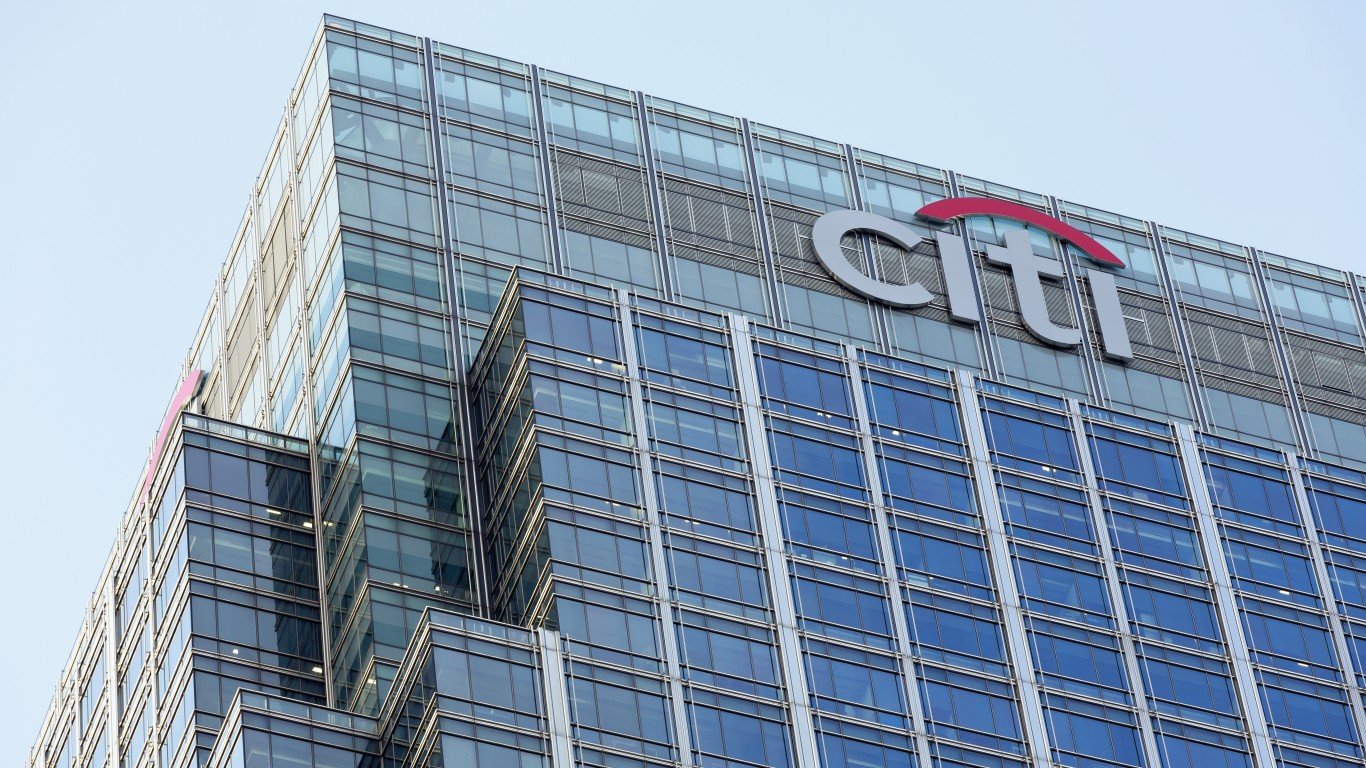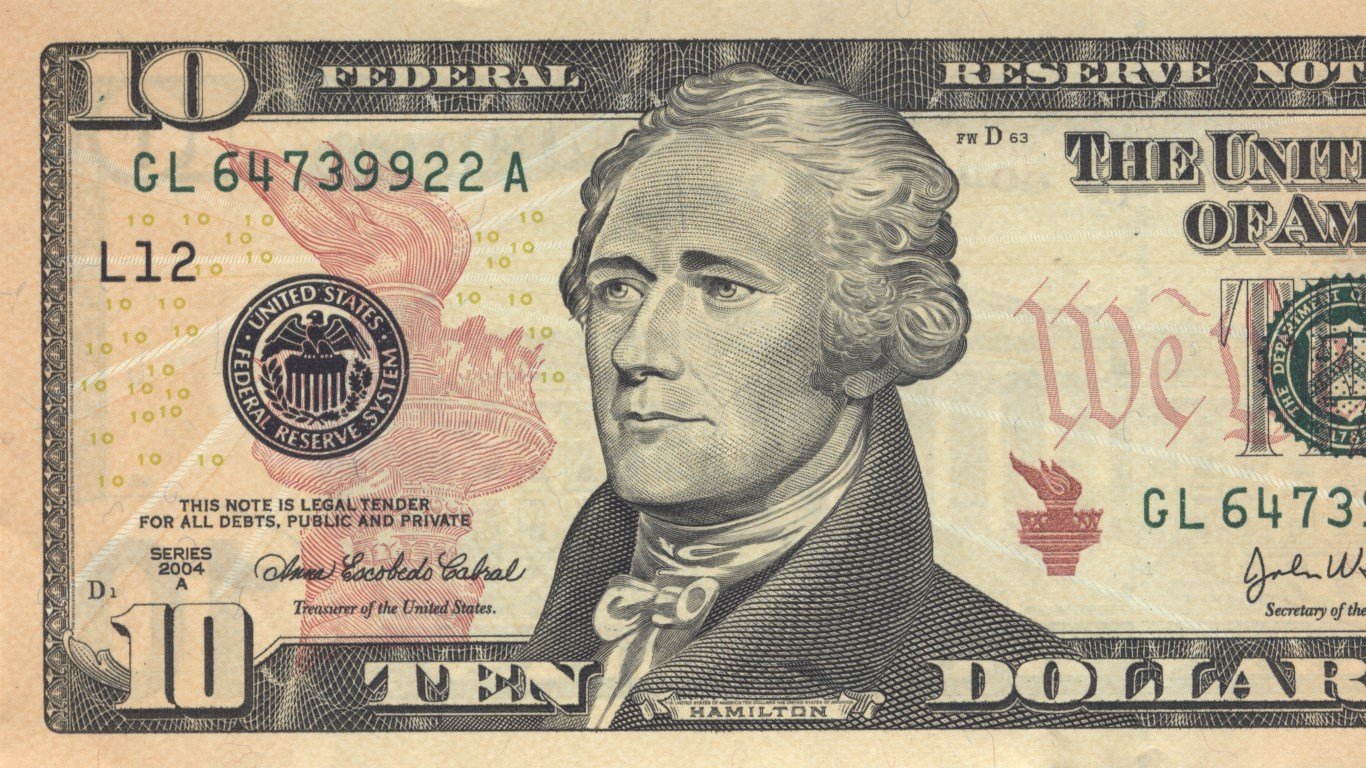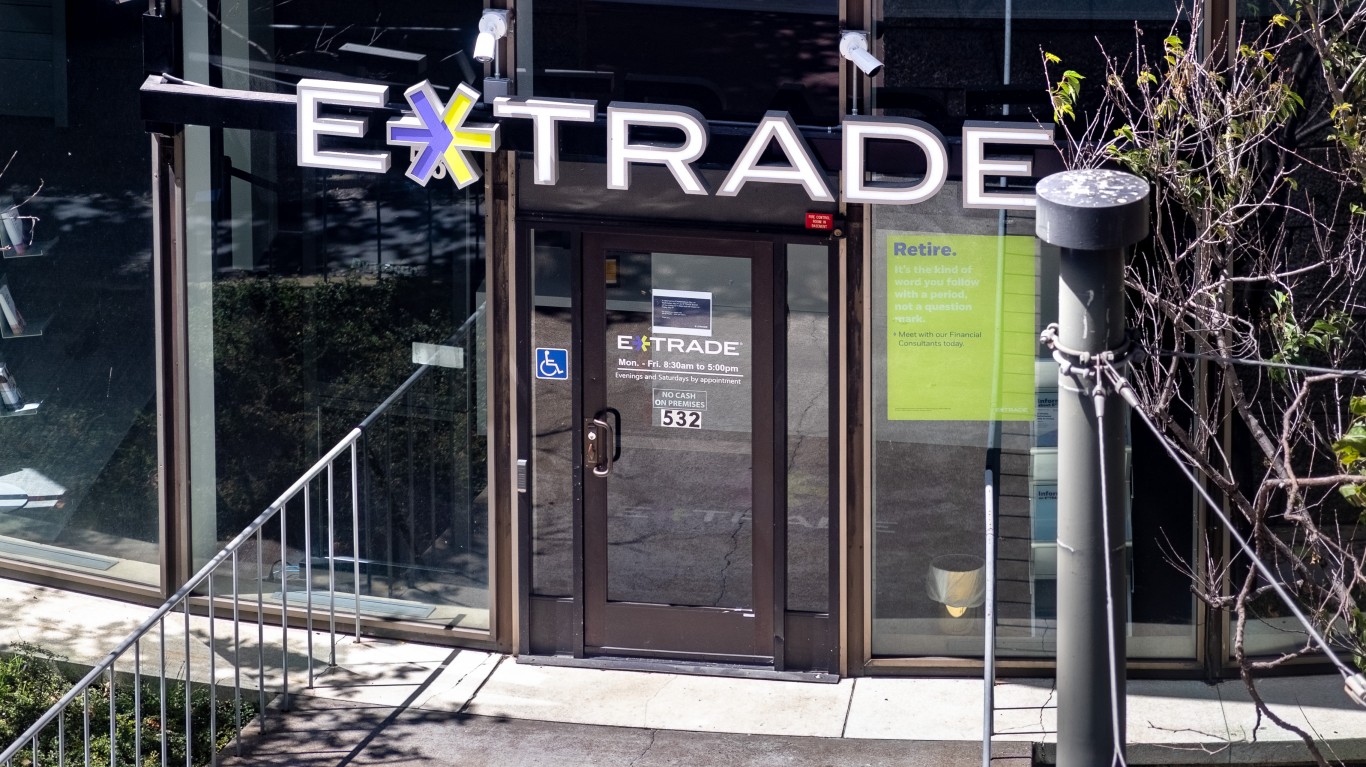

There has been an incredible outperformance of growth over value in recent years. When companies leading the internet and cloud, smartphones and computing, are leading the new American economy in a pandemic, it’s hard to convince investors to look at some of the boring cyclical stocks that are classified as “value stocks.”
However, nothing lasts forever, and this finally may be the case now that the stock market’s growth darlings saw their value brutally punished in September. One simple way that value stock buyers evaluate a company’s true value is by traditional book value. In short, this is what the assets are worth on a net basis after backing out 100% of a company’s debt and other liabilities that it must pay.
24/7 Wall St. has screened the S&P 500 financial sector for the financial companies trading at the deepest discounts to their stated book values. This may be different from a screen against tangible book values, because in a break-up scenario it’s a lot harder to assign values to trade names, values of past acquisitions, patents and trademarks and other intangible assets. Still, the stated book value is the most common used as a starting point by value stock investors.
It turns out that many key stocks are valued handily under their stated book values. This does not mean that every analyst would call these stocks “screaming buys” or anything of the sort. Some discounts to book value are because of challenging business conditions. In other cases, it is because that book value is expected to keep declining, or perhaps the company is losing money or not operating as well as peers.
In the financial sector in particular, low interest rates are driving down bank and long-term insurance earnings alike. The low rates make new long-term life insurance policies more expensive due to lower expected rates of return for the decades ahead (i.e., 1.42% for the 30-year Treasury bond yield). Banks also face more credit losses than were expected a few months ago, and higher inflation with a promise of rates near 0% for a long time will eat into their real returns.
In a Finviz screen, we evaluated discounts to book value and trading history, as well as the Refinitiv consensus analyst price targets. We also included some news developments or other color for trends, and we gave a look at what 2019 earnings looked like to see where these would be valued at current prices had the recession not come on so strongly.
Remember that any book value analysis for value investors is not meant to imply that the stocks have bottomed or that their book values will rise. Some financial stocks have continued to underperform and their stock charts are not exactly pretty. Some of the book values also should be expected to trend lower in the quarters ahead.
1. Lincoln National: 0.29 Times Book Value
Lincoln National Corp. (NYSE: LNC) is a carrier of multiple insurance and retirement businesses under the Lincoln umbrella. It caters to annuities, retirement plan services, life insurance and group protection. One issue that has come into play is that its dividend can be under risk, even though the company is expected to post earnings gains in 2020 and 2021. The economy was so fragile in 2009 that Lincoln slashed its dividend to a penny per quarter, and the dividend is now only back to the pre-Great Recession levels of more than a decade ago.
Lincoln National closed at $32.05 on Monday, in a 52-week range of $16.11 to $62.95. It has a market cap of $6.3 billion, and the current dividend yield is 5.2%. To figure where normalized earnings might go back to in the future, note that the company reported $6.71 in EPS for the 2019 full year, and that would value it at 4.8 times past earnings.
2. Unum Group: 0.32 Times Book Value
Unum Group (NYSE: UNM) looks cheap, and many investors will be quick to hope that the insurer’s earnings will hold up. While it is down from a high well above $50 a share in late 2017, the stock actually is lower than it was after the 2009 market recovery boosted its shares. It also comes with a monster dividend, but Unum operates insurance (financial protection) in the United States and internationally in the form of disability, life, closed block, death and dismemberment and other products.
Unum Group closed at $17.08 on Monday, in a 52-week range of $9.58 to $31.32. It has a market cap of $3.5 billion. The insurance carrier also has a current dividend yield of 6.9%. To figure where normalized earnings might go back to in the future, note that the company reported $5.44 in EPS for the 2019 full year, and that would value it at 3.2 times past earnings.
3. Prudential: 0.37 Times Book Value
Prudential Financial Inc. (NYSE: PRU) is still rather large and comes with a very high dividend yield, but that seems sustainable despite an expected earnings drop of 20% from 2019. While offering investment services, insurance and other financial products, Prudential has more than 50,000 employees and operates via eight units. Despite having lost a third of its value from the high over the past year, Prudential was a $115 stock at the end of 2017.
Prudential closed at $64.03 on Monday, in a 52-week range of $38.62 to $97.24. It has a market cap of $25.5 billion and a current dividend yield of 7.1%. To figure where normalized earnings might go back to in the future, note that the company reported $11.69 in EPS for the 2019 full year, and that would value it at 5.5 times past earnings
4. AIG: 0.38 Times Book Value
American International Group Inc. (NYSE: AIG) is still down almost 50% from its January highs, and the insurance giant remains a shadow of its former self. Despite an expected contraction in earnings, it still is expected to have ample dividend coverage and earnings are expected to snap back to more than 90% of the 2019 level next year. Despite a more focused and safer operating profile since its debacle in the Great Recession, AIG covers insurance products for commercial, institutional and individual customers in North America and many other countries.
AIG closed at $27.63 on Monday, in a 52-week range of $16.07 to $56.42. It has a market cap of $23.9 billion and a current dividend yield of 4.8%. To figure where normalized earnings might go back to in the future, note that the company reported $4.59 in EPS for the 2019 full year, and that would value it at 6.1 times past earnings.
5. MetLife: 0.44 Times Book Value
MetLife Inc. (NYSE: MET) has been trading more or less sideways since May, and most of the great analyst calls with bold targets are old. Its shares are weak enough that the dividend yield was above 5% recently, but it still has more than ample dividend coverage if earnings are down only 10% as the pack of analysts sees in 2020. Those analysts also expect a rapid return to almost 2019 earnings in 2021. MetLife has been jumping on the “green” themes of late as well, and the company announced recently that it plans to spend about $1.7 billion to acquire Versant for vision insurance.
MetLife closed at $37.25 on Monday, in a 52-week range of $22.85 to $53.28. It has a market cap of $34.0 billion. The current dividend yield is 5.1%. To figure where normalized earnings might go back to in the future, note that the company reported $6.11 in EPS for the 2019 full year, and that would value it at 6.1 times past earnings.
6. Citigroup: 0.50 Times Book Value
Citigroup Inc. (NYSE: C) has had the deepest discount of the big money-center banks and mega financials. The bank recently made history by naming a woman to be its chief executive officer. After dipping under $40 a share in the March panic selling, the rapid recovery to above $60 by early June was very short-lived. There was no real earnings bump in July, and it really has not done much but fall since that time. Higher credit losses, lower activity, lower net interest margins and other aspects are weighing on the stock. despite a very strong international presence that is hard to replicate.
Citigroup closed at $43.34 on Monday, in a 52-week range of $32.00 to $83.11. It has a market cap of $90.5 billion. The banking company/insurance carrier has a current dividend yield of 4.9%. To figure where normalized earnings might go back to in the future, note that the company reported $8.04 in EPS for the 2019 full year, and that would value it at 5.4 times past earnings.
7. Citizens Financial: 0.51 Times Book Value
Citizens Financial Group Inc. (NYSE: CFG) is the parent of Citizens Bank, with operations for commercial and consumer banking and financial services in the New England, Mid-Atlantic and Midwest regions with close to 2,700 ATMs and 1,100 branches. It is nearing 200 years since its first founding. With a market cap that is still near $10 billion and with $165 billion in assets at the end of 2019, rising to almost $180 billion in assets at the end of June 2020, its book value held steady at close to $32 per share and was still up 4% from the June 2019 book value. The bank has cited strength in mortgages and ample reserves for credit losses tied to and expected from the COVID-19 fallout.
Citizens Financial closed at $25.34 on Monday, in a 52-week range of $14.12 to $41.29. It has a market cap of $10.8 billion. The banking company also has a current dividend yield of 6.4%. To figure where normalized earnings might go back to in the future, note that the company reported $3.81 in EPS for the 2019 full year, and that would value it at 6.7 times past earnings.
8. Invesco: 0.52 Times Book Value
Invesco Ltd. (NYSE: IVZ) offers broad financial services to retail and institutional clients of all sizes, with separately managed accounts, mutual funds and exchange-traded funds, and even alternative markets like commodities and currencies. It has client-focused equity and fixed income portfolios. The firm also launches equity, fixed income, commodity, multi-asset and balanced mutual funds for its clients. It launches equity, fixed income, multi-asset and balanced exchange-traded funds. Despite a low price and a high yield, and earnings being down an expected 40% or so in 2020, Invesco currently is expected to have ample dividend coverage, and earnings are expected to begin increasing close to 10% higher in 2021.
Invesco closed at $11.49 on Monday, in a 52-week range of $6.38 to $19.01. Its market cap is $5.3 billion. The banking company’s current dividend yield is 5.7%. To figure where normalized earnings might go back to in the future, note that the company reported $2.55 in EPS for the 2019 full year, and that would value it at 4.5 times past earnings.
9. People’s United: 0.55 Times Book Value
People’s United Financial Inc. (NASDAQ: PBCT) is nearly 160 years old and is the bank holding company for People’s United Bank. It offers commercial and retail banking and wealth management services through a network of about 450 branches spread around Connecticut, southeastern New York, Massachusetts, Vermont, Maine and New Hampshire. The dividend yield above 7% feels suspiciously high. Still, the payout looks to have enough earnings coverage, even as earnings expected to fall 20% in 2020 and another 13% in 2021.
People’s United Financial closed at $10.23 on Monday. The 52-week trading range is $9.37 to $17.22, and the market cap is $4.3 billion. The banking company also has a current dividend yield of 7.3%. To figure where normalized earnings might go back to in the future, note that the company reported $1.39 in EPS for the 2019 full year, and that would value it at 7.4 times past earnings.
10. Wells Fargo: 0.61 Times Book Value
Wells Fargo & Co. (NYSE: WFC) may be the bank with the most obvious overhang from its account-opening scandals and other operational scandals in recent years. One thing that is also hurting (along with mortgage rates down at record lows) is that Warren Buffett feels no more loyalty at all and has been aggressively selling down his trove of shares. The Berkshire Hathaway stake has continued to shrink since the end of the second quarter’s 237.6 million shares.
Wells Fargo closed at $23.82 on Monday, in a 52-week range of $22.00 to $54.75. It has a market cap of $99.0 billion. It also has a current dividend yield of 1.7%. To figure where normalized earnings might go back to in the future, note that the company reported $4.05 in EPS for the 2019 full year, and that would value it at 5.9 times past earnings.
Loews: A Runner-Up at 0.55 Times Book Value
Loews Corp. (NYSE: L) is listed as a runner-up because its business model is more conglomerate than true financial. On top of its insurance operations, it operates in the oil and gas business, has a chain of more than two dozen hotels and manufactures certain products. Another reason that Loews was featured was due to a rare and perhaps dangerous comment by CEO Jim Tisch that the stock was egregiously undervalued when it reported earnings (losses) at the start of August. Its stock price was between $35 and $36 most of the days after that report, but they were closer to $33.50 last week before the stock market recovery gave a small boost to Loews’ shares.
Loews closed at $34.73 on Monday, in a 52-week range of $27.33 to $56.88. It has a market cap of $9.6 billion. The insurance carrier also has a current dividend yield of 0.7%. To figure where normalized earnings might go back to in the future, note that the company reported $3.07 in EPS for the 2019 full year, and that would value it at 11.4 times past earnings.
Take This Retirement Quiz To Get Matched With A Financial Advisor (Sponsored)
Take the quiz below to get matched with a financial advisor today.
Each advisor has been vetted by SmartAsset and is held to a fiduciary standard to act in your best interests.
Here’s how it works:
1. Answer SmartAsset advisor match quiz
2. Review your pre-screened matches at your leisure. Check out the
advisors’ profiles.
3. Speak with advisors at no cost to you. Have an introductory call on the phone or introduction in person and choose whom to work with in the future
Take the retirement quiz right here.
Thank you for reading! Have some feedback for us?
Contact the 24/7 Wall St. editorial team.
 24/7 Wall St.
24/7 Wall St. 24/7 Wall St.
24/7 Wall St.


